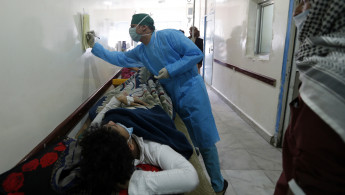Cholera spreading in Houthi-controlled parts of Yemen: UN
The United Nations on Monday expressed concern about the uptick in cholera cases in Yemen, especially in areas of the war-ravaged country controlled by Houthi rebels, where 75 people have died since October.
"Since October last year, we have seen an alarming resurgence of cholera across the country," UN official Edem Wosornu told the Security Council, speaking on behalf of humanitarian chief Martin Griffiths.
Noting that the last cholera epidemic in Yemen dated back to 2019, Wosornu said while the response in government-controlled areas had slowed the spread of the illness and provided treatment for those affected, Houthi-run areas were in need.
"Since March, we have seen the outbreak spread rapidly in areas controlled by the Houthi de facto authorities," the official said.
As of April 7, more than 11,000 suspected cases have been reported in those areas since October, along with the 75 deaths. In comparison, 3,200 suspected cases have been reported in government-controlled areas.
"A rapid response is absolutely critical. The United Nations and our humanitarian partners are working closely with relevant authorities to scale up the response," Wosornu said, calling on the international community to offer money and supplies.
The UN's humanitarian response plan for Yemen for 2024, estimated to cost $2.7 billion, has only been 10 percent funded so far.
The country has seen a lull in fighting that has held in Yemen since the expiry of a six-month truce brokered in April 2022.
But against the backdrop of Israel's war on Gaza, the Iran-backed Houthi rebels have launched dozens of attacks against ships in the Red Sea or the Gulf of Aden which they believe have ties to Israel.
The rebels say they are acting in solidarity with the Palestinians.
The perpetual suffering of Yemen's children⬇
— The New Arab (@The_NewArab) December 26, 2022
✍ A Yemeni journalist https://t.co/T7LijuTcXi
The United Nations special envoy for Yemen, Hans Grundberg, told the Council that while the military situation remained "contained" as compared to before April 2022, there had been an uptick in hostilities on several front lines.
"While the conflicts in Yemen and the wider region have become undeniably interlinked, I strongly believe that we owe it to the Yemenis to ensure that resolving the conflict in Yemen is not made contingent upon the resolution of other issues," Grundberg said.
"We cannot risk Yemen's chance for peace becoming collateral damage," the Swedish diplomat added, warning that such an outcome "could be catastrophic - not only for Yemen, but also for the wider region."





 Follow the Middle East's top stories in English at The New Arab on Google News
Follow the Middle East's top stories in English at The New Arab on Google News
![The UAE is widely suspected of arming the RSF militia [Getty]](/sites/default/files/styles/image_330x185/public/2024-11/GettyImages-472529908.jpg?h=69f2b9d0&itok=Yauw3YTG)
![Netanyahu furiously denounced the ICC [Getty]](/sites/default/files/styles/image_330x185/public/2024-11/GettyImages-2169352575.jpg?h=199d8c1f&itok=-vRiruf5)
![Both Hamas and the Palestinian Authority welcomed the ICC arrest warrants [Getty]](/sites/default/files/styles/image_330x185/public/2024-11/GettyImages-2178351173.jpg?h=199d8c1f&itok=TV858iVg)